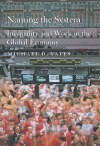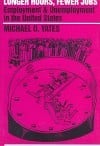If prisons were places people who have committed serious crimes were sent to pay a debt to society, and to be rehabilitated to return to society as healthy members of it, then at least the following things would be true. First, people who had not committed serious crimes would not be in prison at all. Drug users and persons with mental illnesses would receive treatment and would live in their communities, either at home or in safe and hospitable facilities run as public entities. Those who had committed minor criminal offences, such as shoplifting, would be given non-prison sentences involving counseling and community service. As much as possible, communities would be involved in both setting the penalties and organizing and participating in the treatment. Ironically, this was typically the case in American Indian communities, now so ravaged by the U.S. criminal injustice system | more…
A New Economy? Today, we hear a lot of talk about the New Economy, much of it unsubstantiated and hyperbolically stated. In the United States, for example, consumers are supposedly concerned, as never before, with high-quality goods and services tailored specifically to their individual needs. Rapidly changing technology continually creates new, high-quality products, so consumer needs are perpetually changing as well. This rapid change places new demands on businesses. They must be maximally flexible, capable of changing product lines quickly, and able at all times to meet discerning and highly individualized consumer needs. Everything must be geared to customer satisfaction; a firm that does not quickly and consistently please its customers will lose business sooner than at any time in the past. The tremendous range of choices available means that customers will not be loyal to any company that cannot offer speedy gratification. Recently an Internet book company opened that promised same-day delivery! | more…
Eleanor Marx and Edward Aveling, The Working Class Movement in America, edited by Paul Le Blanc (Amherst, NY: Humanity Books, 2000), $55, 231 pp.; Paul Le Blanc, A Short History of the US Working Class (Amherst, NY: Humanity Books, 1999), $30 (cloth), $20 (paper), 205 pp.
1886 was a momentous year in United States labor history. The great eight-hours movement had swept across the nation, and the Knights of Labor were in full flower. Working class politicial parties were forming, and the American Federation of Labor had been founded. In that year, Karl Marx’s daughter, Eleanor, and her partner, Edward Aveling, toured the United States, giving lectures and meeting comrades as guests of the Socialist Labor Party. They then returned to England and wrote about their trip. The first book under review is a timely reprint of the original. In addition to the reprint, it includes a useful introduction by Paul Le Blanc (including a fine annotated labor history bibliography) and interesting essays by historian Lisa Frank on Eleanor Marx and by writer and labor activist Kim Moody on aspects of working class life the two visitors failed to see | more…
Will This Include the US Labor Movement?
Capitalism is a system of production and distribution driven by the ceaseless efforts by capitalists to accumulate capital, that is, to maximize both profits and the growth of capital. Accumulation, in turn, is made possible by the exploitation of wage laborers, persons without any direct access to society’s productive property. Workers are forced to sell their ability to work but when they do, they are owed nothing by their employers except a wage. That is, the employers have no social obligation to the workers; their relationship to them is impersonal in the extreme. It follows that, in the abstract, employers do not care anything about the workers’ “characteristics.” To them, black workers are interchangeable with whites, men with women, one nation’s workers with those of any other. Employers are, in a word, equal-opportunity exploiters. They will replace one worker with another, move their capital to take advantage of cheaper labor (whatever its characteristics), and pit one group of employees against another, whenever such actions will, in their view, make it easier for them to accumulate capital | more…
Laboring in the Academic Factory
Consider the following items culled from some of the journals, newspapers, and email discussion groups to which I subscribe: | more…
Paul Buhle, Taking Care of Business: Samuel Gompers, George Meany, Lane Kirkland, and the Tragedy of American Labor (New York: Monthly Review Press, 1999), $18, 315 pp.; Mike Parker & Martha Gruelle, Democracy is Power: Rebuilding Unions from the Bottom Up (Detroit: Labor Notes, 1999), $17, 255 pp.
In a very well-known passage, Marx said, “Men make their own history, but they do not make it just as they please; they do not make it under circumstances chosen by themselves, but under circumstances directly encountered, given and transmitted from the past.” Elsewhere, he said, “The tradition of all the dead generations weighs like a nightmare on the brain of the living.” These words of wisdom provide us with a good entry point into a review of these two exceptional books | more…

The economic boom of the 1990s created huge wealth for the bosses, but benefitted workers hardly at all. At the same time, the bosses were able to take the political initiative and even the moral high ground, while workers were often divided against each other. This new book by leading labor analyst Michael D. Yates seeks to explain how this happened, and what can be done about it. | more…
Since Paul Sweezy gently rejected my first submission to Monthly Review in 1972, he and Harry Magdoff and all of the MR writers and staffpersons, living and deceased, have been my mentors, helping me to see things more clearly and to act more effectively. And Harry Braverman’s book ranks near the top of MR’s books which have deeply influenced my thinking. I remember mentioning it in my PhD defense in 1976. I told the committee that one of the weaknesses of my thesis, which was about public school teachers’ unions, was that it had not incorporated the pioneering work of Harry Braverman in Labor and Monopoly Capital. I had a suspicion that the work of teachers was not immune to the forces described so well by Braverman: detailed division of labor, mechanization, Taylorization. Today, as the fine scholar David Noble will tell us, these forces are bearing down upon the professoriate, with potentially devastating results | more…

Big changes in the global economy and world politics have put new questions on the table for labor movements around the world. Can workers regain the initiative against the tidal wave of corporate downsizing and government cutbacks? Can unions revive their ranks and reignite the public imagination? Is labor rising from the ashes? | more…

Millions unemployed… fewer people working harder for less pay and shrinking benefits… the assets of the wealthiest one percent of the population growing as the population below the poverty line swells… the next generation facing an even more bitter future… Why? Most working people cannot answer this question. In this user-friendly book, Michael Yates explains how employment and unemployment are inextricably connected in an economic system where employers are driven by the search for profits. | more…


